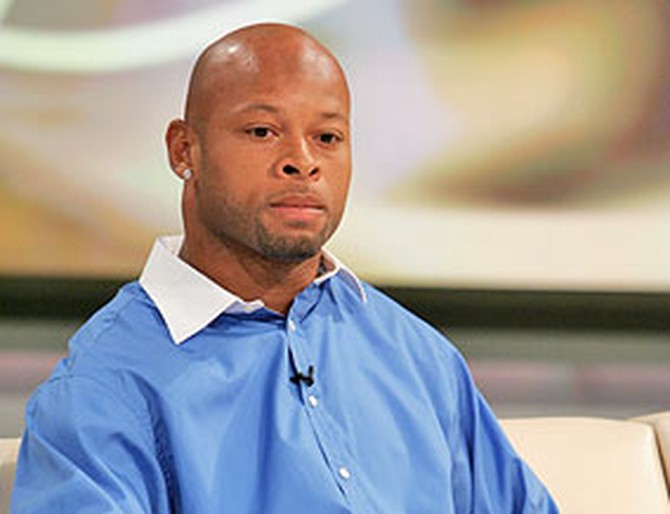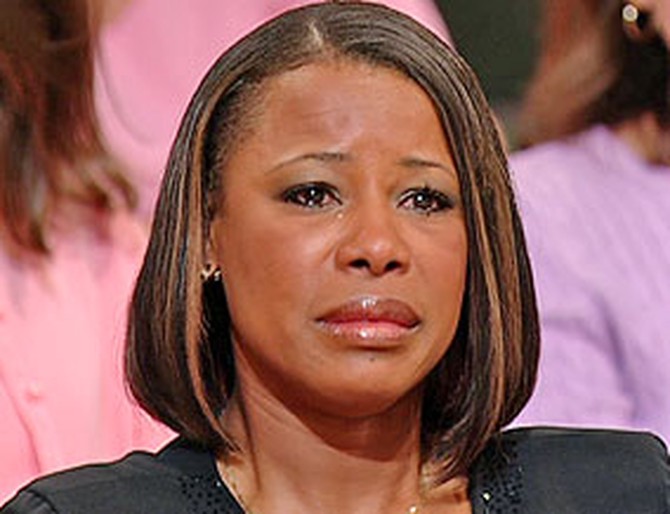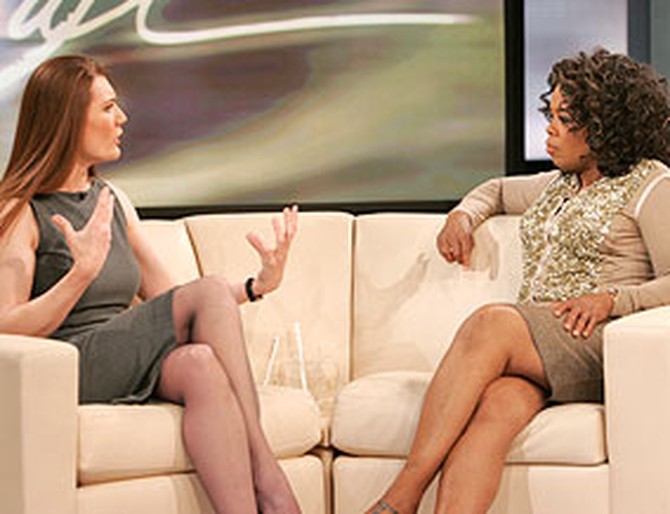Secrets Revealed

Photo: Tom Berg/WireImage.com
Laveranues Coles, one of the NFL's brightest stars, is a wide receiver for the New York Jets with a $30 million contract. While Laveranues seems to be living the American dream, inside he is haunted by a nightmare from his childhood—a secret his coach and even his closest teammates didn't know.
Laveranues's decision to share his story on The Oprah Winfrey Show did not come easily. He has struggled with fear and old feelings of shame. For Laveranues Coles, this decision is an act of bravery.
When Laveranues was 10 years old, his mother, Sirretta, met the man who would become Laveranues's stepfather—and make his life a living hell. For three torturous years, Laveranues says his stepfather sexually abused him at gunpoint. "My mom took a night job," Laveranues recalls. "From there, that's when he started creeping into my room."
In the beginning, Laveranues's abuser kept his gun close at hand, using it as a scare tactic, not as a threat. But things quickly escalated. As their contact became more frequent, Laveranues's stepfather pointed the gun at his head during the assaults. Fearing for his life, Laveranues kept this horrific secret. "He would tell me that if I ever told my mom," Laveranues remembers, "he would kill her and then kill me. My soul was damaged. I felt like I was trapped."
Laveranues's decision to share his story on The Oprah Winfrey Show did not come easily. He has struggled with fear and old feelings of shame. For Laveranues Coles, this decision is an act of bravery.
When Laveranues was 10 years old, his mother, Sirretta, met the man who would become Laveranues's stepfather—and make his life a living hell. For three torturous years, Laveranues says his stepfather sexually abused him at gunpoint. "My mom took a night job," Laveranues recalls. "From there, that's when he started creeping into my room."
In the beginning, Laveranues's abuser kept his gun close at hand, using it as a scare tactic, not as a threat. But things quickly escalated. As their contact became more frequent, Laveranues's stepfather pointed the gun at his head during the assaults. Fearing for his life, Laveranues kept this horrific secret. "He would tell me that if I ever told my mom," Laveranues remembers, "he would kill her and then kill me. My soul was damaged. I felt like I was trapped."

Laveranues says the abuse caused him to act out at school. His grades began to suffer and he was overwhelmed by feelings of rage. "I just really never cared about anything," says Laveranues. "I was just always angry. … wondering, 'why is this happening to me?'"
In eighth grade, Laveranues discovered that his stepfather had started a rumor among his friends at school that he was gay. When Laveranues found out that one of his closest friends had helped his stepfather spread the rumor, he became violently angry. "I grabbed [the friend] and went after him pretty bad. … I was so furious."
The police officer called to the scene sensed that something more than mere adolescent angst had caused Laveranues's outburst. After intense questioning, Laveranues finally confessed his secret. "From there," he says, "everything unraveled."
In eighth grade, Laveranues discovered that his stepfather had started a rumor among his friends at school that he was gay. When Laveranues found out that one of his closest friends had helped his stepfather spread the rumor, he became violently angry. "I grabbed [the friend] and went after him pretty bad. … I was so furious."
The police officer called to the scene sensed that something more than mere adolescent angst had caused Laveranues's outburst. After intense questioning, Laveranues finally confessed his secret. "From there," he says, "everything unraveled."

Sirretta, Laveranues's mother, first learned of her son's sexual abuse when she was called to the school that day. Stunned by the news, Sirretta says "the only thing that I could literally do was—just in shock—begin to weep."
Because Sirretta worked night shifts, she says she had no knowledge of the abuse. "I've searched my heart over and over and over to try to figure out why I did not see it," says Sirretta. "I did not have any idea or I would never have stayed in that relationship."
Laveranues's stepfather was sentenced to nine years in prison in 1992 after pleading guilty to the charges. He served three and a half years.
Looking back, Sirretta says her now ex-husband had certain unsettling characteristics. "When you see certain things, you make excuses for it instead of calling it what it is," she says.
Almost 15 years have passed since Laveranues's horrific secret was exposed. Now 27, Laveranues says he and his mother have never spoken about the abuse… until now.
Because Sirretta worked night shifts, she says she had no knowledge of the abuse. "I've searched my heart over and over and over to try to figure out why I did not see it," says Sirretta. "I did not have any idea or I would never have stayed in that relationship."
Laveranues's stepfather was sentenced to nine years in prison in 1992 after pleading guilty to the charges. He served three and a half years.
Looking back, Sirretta says her now ex-husband had certain unsettling characteristics. "When you see certain things, you make excuses for it instead of calling it what it is," she says.
Almost 15 years have passed since Laveranues's horrific secret was exposed. Now 27, Laveranues says he and his mother have never spoken about the abuse… until now.

Laveranues says the shame he carried from his abuse affected every aspect of his life. From the time it began, Laveranues says he became withdrawn, distrustful, and isolated. "If I had a problem, I dealt with it internally," he says. "I was in my own little world for a long time."
Laveranues believes his inability to trust others affected his relationships with women especially. "It makes it very hard for me to trust women," he says. "I think it has a lot to do with why I'm probably not married today because the way I felt about myself…not knowing how a woman would take having a man that this has happened to."
Although he was afraid to go public with his secret, Laveranues felt compelled to share his story so he could help other children suffering in silence. "Here I am, a professional athlete, with the opportunity to say something and maybe reach one child that this is happening to, and give him the courage and the strength to come out and say 'this is happening to me and this is wrong.'"
Laveranues believes his inability to trust others affected his relationships with women especially. "It makes it very hard for me to trust women," he says. "I think it has a lot to do with why I'm probably not married today because the way I felt about myself…not knowing how a woman would take having a man that this has happened to."
Although he was afraid to go public with his secret, Laveranues felt compelled to share his story so he could help other children suffering in silence. "Here I am, a professional athlete, with the opportunity to say something and maybe reach one child that this is happening to, and give him the courage and the strength to come out and say 'this is happening to me and this is wrong.'"

Dr. Robin shared a profound message with Laveranues for his brave testimony. "I have met a man today who is a miracle," says Dr. Robin. "You are an example—a beautiful, perfected example—of what it means to be a man. What it means to be strong. What it means to be real."
Identifying the molestation for what it truly is, says Dr. Robin, is essential for healing. "It is not just being molested. We need to call it what it is: Rape." Dr. Robin explains that by referring to the abuse as "sexual molestation," the severity of the crime is diminished. "It is rape," Dr. Robin continues. "It's not just physical. It's not just sexual. It's the normal parts of life that you couldn't even do without being reminded of the filth that was brought into your life. The other piece that was raped was your spirit."
Breaking the silence is another crucial element for recovery. "The silence is as deadly as the abuse," says Dr. Robin. "When we're silent about stuff, what we're really saying is 'this is so bad and it's so ugly and it's so dark that we can't even speak'. … We've got to come together as a family…begin to talk about what really happened, so as we do that, we break the clutches that this man had on you."
Identifying the molestation for what it truly is, says Dr. Robin, is essential for healing. "It is not just being molested. We need to call it what it is: Rape." Dr. Robin explains that by referring to the abuse as "sexual molestation," the severity of the crime is diminished. "It is rape," Dr. Robin continues. "It's not just physical. It's not just sexual. It's the normal parts of life that you couldn't even do without being reminded of the filth that was brought into your life. The other piece that was raped was your spirit."
Breaking the silence is another crucial element for recovery. "The silence is as deadly as the abuse," says Dr. Robin. "When we're silent about stuff, what we're really saying is 'this is so bad and it's so ugly and it's so dark that we can't even speak'. … We've got to come together as a family…begin to talk about what really happened, so as we do that, we break the clutches that this man had on you."

As a glamorous entertainment reporter and New York socialite, Jeannette Walls interviews the rich and famous at the hottest red carpet events. When she began her career, she not only wanted to cover high society—she wanted to live it, too. "I was married to a very well to do man. … I lived a life right out of Vanity Fair. I thought I had everything. But at the same time, I was a complete phony."
Far from her posh Park Avenue apartment was the home in West Virginia Jeannette left behind years ago. Her family's small house had no indoor plumbing, and instead of a toilet, they used a bucket in the kitchen. Jeannette's alcoholic father and eccentric mother could not hold down jobs and the family was penniless. "We'd go for days sometimes without food," Jeannette remembers. "We'd sometimes look in the garbage [around] us for food."
At age 17 with only $100, Jeannette boarded a bus to New York determined never to look back. With sheer determination, she finished high school, graduated from Barnard—an Ivy League college—and became a rising star reporter—but Jeannette's past followed her.
Far from her posh Park Avenue apartment was the home in West Virginia Jeannette left behind years ago. Her family's small house had no indoor plumbing, and instead of a toilet, they used a bucket in the kitchen. Jeannette's alcoholic father and eccentric mother could not hold down jobs and the family was penniless. "We'd go for days sometimes without food," Jeannette remembers. "We'd sometimes look in the garbage [around] us for food."
At age 17 with only $100, Jeannette boarded a bus to New York determined never to look back. With sheer determination, she finished high school, graduated from Barnard—an Ivy League college—and became a rising star reporter—but Jeannette's past followed her.

To Jeannette's horror, her vagabond parents trailed her to New York. Even though Jeannette and her sister tried to help their mother and father with housing, her parents chose to remain homeless. As she lived in the lap of luxury, her parents slept on the streets. Embarrassed by their position in life, Jeanette pleaded with her parents not to tell anyone they were related.
Jeannette realized she could no longer live the lie when, on her way to a party, she saw a woman rooting around in a dumpster—the woman was her mother. "To my eternal shame," Jeannette says, "I slid down in the back of the taxi and hid."
Jeannette says it wasn't until she began writing her book, The Glass Castle, that she began to learn to accept and understand her parents' lifestyle. Oprah also played a role in inspiring Jeannette to shed her shame. While covering the launch of O, The Oprah Magazine, Jeannette interviewed Editor at Large Gayle King. "I said, 'What makes Oprah Winfrey special?'" Jeannette remembers. "She said, 'While Oprah's pulling herself up with one hand, she's pulling other people up with the other hand.' It made me really think about my own life because I'd been very selfish in trying to get ahead."
Jeannette realized she could no longer live the lie when, on her way to a party, she saw a woman rooting around in a dumpster—the woman was her mother. "To my eternal shame," Jeannette says, "I slid down in the back of the taxi and hid."
Jeannette says it wasn't until she began writing her book, The Glass Castle, that she began to learn to accept and understand her parents' lifestyle. Oprah also played a role in inspiring Jeannette to shed her shame. While covering the launch of O, The Oprah Magazine, Jeannette interviewed Editor at Large Gayle King. "I said, 'What makes Oprah Winfrey special?'" Jeannette remembers. "She said, 'While Oprah's pulling herself up with one hand, she's pulling other people up with the other hand.' It made me really think about my own life because I'd been very selfish in trying to get ahead."

Dr. Robin says there is an unspoken epidemic in America: Women who are living a lie. Even if our stories are not as extreme as Jeannette's, she says, many of us live beyond our means or turn a blind eye to our husband's affairs. Dr. Robin explains that fear and shame keep us from living real lives.
"The lies that people live every day," Dr. Robin tells Jeannette, "may not feel as dramatic or drastic as yours, but people are pretending to be happy when they're not. … People are scared of their own stories."
Coming face-to-face with her story brought Jeannette a measure of relief she never imagined possible. With the publication of her book, Jeannette expected to lose her friends, her job and everything she'd worked so hard for. Instead, she found overwhelming empathy and acceptance. "I've never been so wrong about anything in my life," she says. "I hugely underestimated people's capacity for compassion."
"The lies that people live every day," Dr. Robin tells Jeannette, "may not feel as dramatic or drastic as yours, but people are pretending to be happy when they're not. … People are scared of their own stories."
Coming face-to-face with her story brought Jeannette a measure of relief she never imagined possible. With the publication of her book, Jeannette expected to lose her friends, her job and everything she'd worked so hard for. Instead, she found overwhelming empathy and acceptance. "I've never been so wrong about anything in my life," she says. "I hugely underestimated people's capacity for compassion."
Published 10/18/2005

